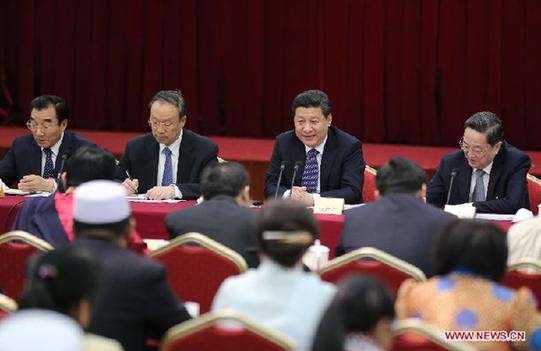Regaining reform momentum
china.org.cn / chinagate.cn by Pei Minxin, March 6, 2014 Adjust font size:
The annual session of the National People’s Congress (NPC) in China is normally associated with political symbols and pro forma procedures. In a year where leadership transition is scheduled, such as 2013, these sessions tend to attract more attention because they formally appoint senior party leaders to key administrative positions in the central government, particularly the State Council (the country’s cabinet).
|
Chinese President Xi Jinping (2nd R, back), also general secretary of the Communist Party of China (CPC) Central Committee and chairman of the Central Military Commission, visits members of the 12th National Committee of the Chinese People's Political Consultative Conference (CPPCC) from ethnic minority groups and joins their panel discussion in Beijing, capital of China, March 4, 2014. Yu Zhengsheng, chairman of the National Committee of the CPPCC and a member of the Standing Committee of the Political Bureau of the CPC Central Committee, also attended the event. [Xinhua/Ding Lin] |
However, in years where no leadership change is expected, the NPC’s annual sessions perform three functions. One is to pass important legislations or make constitutional amendments. Another is to reaffirm the Communist Party’s top policy priorities. And the third one is to gauge the public mood through the discussions of the delegates. Despite the highly choreographed nature of the proceedings, the NPC sessions sometimes feature unexpected drama and provide a revealing glimpse into the political mood of China’s elites.
As Beijing gears up for this year’s NPC annual session, most analysts are focusing on whether, in the aggregate, this gathering will inject fresh momentum into Xi Jinping’s ambitious reform agenda, which was unveiled at the third plenum of the Communist Party’s Central Committee in November last year. In the three and half months since Xi surprised the world with his proposed reforms, only small steps have been taken to fulfill his bold vision. For example, among the major reforms, only the relaxation of the one-child policy has been implemented. All the other key initiatives are either being debated or translated into actual policy inside the Chinese bureaucracy.
Politically, it is critical that Xi and his colleagues take advantage of the NPC session to dispel doubts about their ability to push through the announced reforms. Of course, given the vast scale and complexity of their reform agenda, it would be unrealistic to expect them to produce anything more than a few specific policies during this year’s NPC session.
Based on the announcement following the recent conclusion of the Central Committee’s Leading Group on Comprehensively Deepening Reform, which was formed at the end of the third plenum and is now headed by Xi himself, it is possible to identify the key objectives Xi and his colleagues want to achieve in this year’s NPC session.
First and foremost, the Chinese leadership will seek formal legislative approval of some of the signature reform proposals announced last November. Even though China is ruled by a one-party state and the Chinese Communist Party usually has the last word, Chinese leaders since Mao have tried very hard to follow formal legal procedures in turning their policy initiatives into law. In this year’s case, Xi clearly needs a green light from the NPC for two of his boldest initiatives: land and legal reforms.


